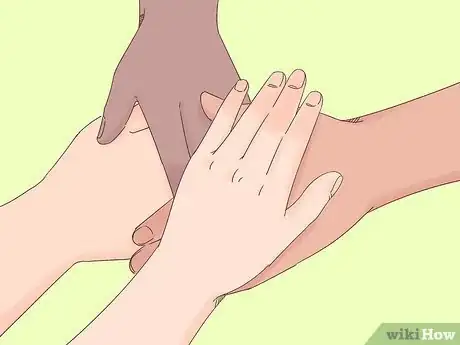This article was co-authored by Sandra Possing. Sandra Possing is a life coach, speaker, and entrepreneur based in the San Francisco Bay Area. Sandra specializes in one-on-one coaching with a focus on mindset and leadership transformation. Sandra received her coaching training from The Coaches Training Institute and has seven years of life coaching experience. She holds a BA in Anthropology from the University of California, Los Angeles.
There are 12 references cited in this article, which can be found at the bottom of the page.
wikiHow marks an article as reader-approved once it receives enough positive feedback. In this case, 98% of readers who voted found the article helpful, earning it our reader-approved status.
This article has been viewed 1,256,472 times.
If you want to become open to different ideas, beliefs, and backgrounds, you're in luck! There plenty of fun, simple ways to exercise an open mind. Try new things and meet new people whenever you can, and work on listening more than you talk. Everyone has preconceived notions, so challenge your beliefs, and do your best to notice when you make assumptions.[1] The more you practice, the easier it'll be to relate to people from all walks of life.
Steps
Trying New Things
-
1Listen to new music. Try to listen to a new genre of music each week. Explore your streaming service's channels, browse online, or ask a friend for recommendations.[2]
- Listening to music across genres, from different parts of the world, and from different points in history can make your brain become more receptive to new experiences. New music can help you emotionally connect with new people, places, and things.
-
2Read more novels and short stories. A good story can put you in the shoes of someone from a different place and time. Head to your local library, search the collection, and look for novels with unfamiliar plots, settings, and characters.[3]
- For example, you could read books by authors from other countries, or read about the struggles of having an identity (such as a gender, ethnicity, or sexual orientation) other than your own.
Advertisement -
3Learn a new language. A new language can allow you to communicate with new people and help you appreciate new cultures. Look for a local community college course or use an app to start learning.[4]
- Learning a new language can help promote understanding across cultural barriers. How a culture puts their thoughts into words can offer insight into its values and traditions.
-
4Attend a service at a place of worship other than your own. Try to get a better understanding of a different religious tradition. You could ask a friend who practices a different faith if you can attend a service with them. You could also find a church, mosque, synagogue, temple, or another place of worship in your area and go on your own.[5]
- It may be polite to ask the place of worship if you can come in advance. You want to avoid crashing things like weddings or holy holidays without an invitation.
- Come to these services with an open mind. Don't expect to explain your belief system or try to prove their views wrong. Simply listen, observe, and try to express gratitude to this new group for sharing their time and their values with you.
-
5Take a hands-on class. Learning a new skill is a great way to become more open to new experiences.[6] You could take a class in something you're already interested in, or take up a new hobby. For instance, take a gardening, cooking, yoga, or martial arts class.[7]
- Community centers, recreation centers, community colleges, and university extension centers often offer these types of classes for free or at a lower cost.
- Boosting your creativity can be especially beneficial, so try taking dance, painting, drawing, acting, and other arts-related classes.
- Group classes are also great ways to meet new people.
Meeting New People
-
1Work on listening more than you talk. You can meet all the people in the world, but you'll never learn anything about them if you do all the talking. Try to ask people more questions, and listen actively instead of thinking about the next thing you'll say.[8]
- To listen actively, give someone your undivided attention. Don't play with your phone or daydream as they speak. Make eye contact and nod occasionally to indicate you're listening. Try to visualize the events, objects, or people they describe.
-
2Start conversation with new people whenever you can.[9] Diverse viewpoints can help you see things new ways and grow as a person. Do your best to chat with people of different backgrounds or beliefs in your everyday life.
- For instance, sit with someone you normally wouldn't talk to during your lunch break at school or work.
- Let your conversation develop naturally instead of immediately ask about their religious or political beliefs. Try to get to know them by asking, “Where are you from?” or “What do you like to do for fun?”
- Some college campuses and community organizations will hold events meant to bring people with different backgrounds and beliefs together. Events like those put on by the Human Library, where people from different backgrounds volunteer as human books that you can "check out" for an open conversation, can help you connect with a wide variety of people.
-
3Seize opportunities to visit new places. You don't need to go far to get the benefits of travel. Just look for a place where the way of life is different than your own. Immersing yourself in a new place is a great way to see the world from a different perspective.[10]
- Enter new places with a curious mindset. Avoid judging or making assumptions just because different cultures do things differently. Instead, try to remain open and learn as much as you can.[11]
- International travel is a great way to understand different beliefs. Plan a trip to a place where you don't speak the language and don't have many connections. Learning to navigate a new part of the world without your normal tools will help broaden your perspective.
- If you can't make it abroad, look nearby for something that will challenge you. If you live in a city, go camping in the woods for a few days. Do you live in California? Try taking a trip to the American South to meet new people, try new food, and learn about different ways of life.
-
4Volunteer for a local charity or non-profit. Set aside time to volunteer with an organization that will expose you to diverse groups of people, such as a food pantry, shelter, or youth center. Helping others, especially those who are different from you, might allow you to recognize how wants, needs, and dreams can cross boundaries.[12]
- For a really unique experience, consider combining volunteering and travel. Going on a volunteer trip or even setting aside a single day to volunteer while you're in a new place can help open you up to completely different people and perspectives.
Challenging Your Beliefs
-
1Ask yourself how you formed a belief. Take a look at the beliefs you hold and ask yourself, “How did I come to believe this?” Think about who taught you a belief and how your life experiences have reinforced it.[13]
- For example, if you were raised believing that hard work is all you need to succeed, ask yourself, “Are there people who worked hard but still struggled in life? Are there other factors that may impact your ability to succeed outside of your work ethic?”
-
2Try to notice whenever you make an assumption. Assumptions are a natural part of thinking but, left unchecked, they can lead to close-mindedness. When you meet new people or find yourself in new situations, pay attention to your expectations. Ask yourself if your preconceived notions shape the way you act.[14]
- Say, for example, you've never tried pasta with pesto sauce, and you assume you'll hate it. Ask yourself why you assume you would dislike it. Is it because the sauce is green? Is it because you don't like the smell? Maybe you don't have a great reason to make the assumption, and you should give pesto a try!
-
3Browse online for information about new topics and perspectives. Make the most of your downtime by looking into new information when you have a few free minutes. Try looking online for articles, videos, and podcasts about academic subjects, current events, religions, and international cultures.[15]
- Start a new article when you're in line at the bank, for example, or listen to a podcast during your commute.
- Be sure to look for using reputable sources. There's a lot of false and biased information available online. Look for scholarly articles, reports published by independent third-party organizations, and information from credible sites, like governments, universities, and reputable news bureaus.
-
4Think of the reasons someone holds an opinion that opposes your own. Choose a polarizing topic and read some newspaper articles or listen to podcasts about it. Look for sources with perspectives that differ from your own. Try to think about the issue the way the other side would.[16]
- Suppose you want to see a higher minimum wage. As you research the issue, you might read about small business owners who are afraid that higher payroll costs would force them to close. While you still stand by your belief, you might realize an opposing perspective might have valid points.
Expert Q&A
Did you know you can get expert answers for this article?
Unlock expert answers by supporting wikiHow
-
QuestionHow do you develop broad thinking?
 Sandra PossingSandra Possing is a life coach, speaker, and entrepreneur based in the San Francisco Bay Area. Sandra specializes in one-on-one coaching with a focus on mindset and leadership transformation. Sandra received her coaching training from The Coaches Training Institute and has seven years of life coaching experience. She holds a BA in Anthropology from the University of California, Los Angeles.
Sandra PossingSandra Possing is a life coach, speaker, and entrepreneur based in the San Francisco Bay Area. Sandra specializes in one-on-one coaching with a focus on mindset and leadership transformation. Sandra received her coaching training from The Coaches Training Institute and has seven years of life coaching experience. She holds a BA in Anthropology from the University of California, Los Angeles.
Life Coach
-
QuestionHow can I avoid judging other people?
 Sandra PossingSandra Possing is a life coach, speaker, and entrepreneur based in the San Francisco Bay Area. Sandra specializes in one-on-one coaching with a focus on mindset and leadership transformation. Sandra received her coaching training from The Coaches Training Institute and has seven years of life coaching experience. She holds a BA in Anthropology from the University of California, Los Angeles.
Sandra PossingSandra Possing is a life coach, speaker, and entrepreneur based in the San Francisco Bay Area. Sandra specializes in one-on-one coaching with a focus on mindset and leadership transformation. Sandra received her coaching training from The Coaches Training Institute and has seven years of life coaching experience. She holds a BA in Anthropology from the University of California, Los Angeles.
Life Coach
References
- ↑ Sandra Possing. Life Coach. Expert Interview. 13 August 2020.
- ↑ https://www.pri.org/stories/2012-07-19/research-shows-listening-different-musical-generes-leaves-lasting-impact-brain
- ↑ https://oedb.org/ilibrarian/your-brain-on-books-10-things-that-happen-to-our-minds-when-we-read/
- ↑ https://www.cambridge.org/elt/blog/2022/04/29/learning-language-changes-your-brain/
- ↑ https://ctb.ku.edu/en/table-of-contents/culture/cultural-competence/building-relationships/main
- ↑ Sandra Possing. Life Coach. Expert Interview. 13 August 2020.
- ↑ https://www.health.harvard.edu/mind-and-mood/train-your-brain
- ↑ Sandra Possing. Life Coach. Expert Interview. 13 August 2020.
- ↑ Sandra Possing. Life Coach. Expert Interview. 13 August 2020.
- ↑ https://au.reachout.com/articles/understanding-a-different-culture
- ↑ Sandra Possing. Life Coach. Expert Interview. 13 August 2020.
- ↑ https://www.helpguide.org/articles/healthy-living/volunteering-and-its-surprising-benefits.htm
- ↑ http://www.criticalthinking.org/pages/open-minded-inquiry/579
- ↑ https://www.psychologytoday.com/us/blog/sustainable-life-satisfaction/201909/are-you-guilty-of-making-too-many-assumptions
- ↑ http://oedb.org/ilibrarian/hacking-knowledge/
- ↑ https://www.authentichappiness.sas.upenn.edu/newsletters/authentichappinesscoaching/open-mindedness
About This Article
To exercise an open mind, try to expose yourself to as many new ideas and perspectives as possible by doing things like listening to new music, reading lots of books, and taking up new hobbies. Also, make an effort to start conversations with new people whenever you can, which will expose you to differing viewpoints. You can also be more open minded by researching different cultures, beliefs, and subjects online. To learn how to overcome assumptions and beliefs so you can be more open-minded, scroll down!












































































